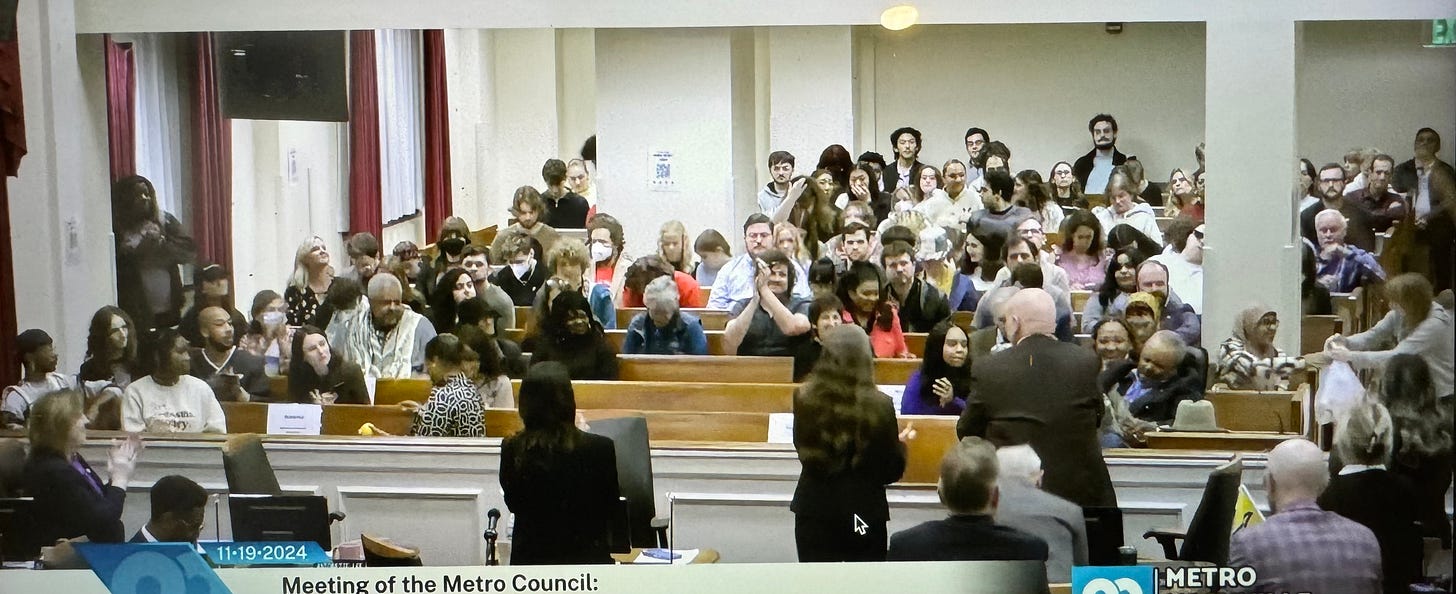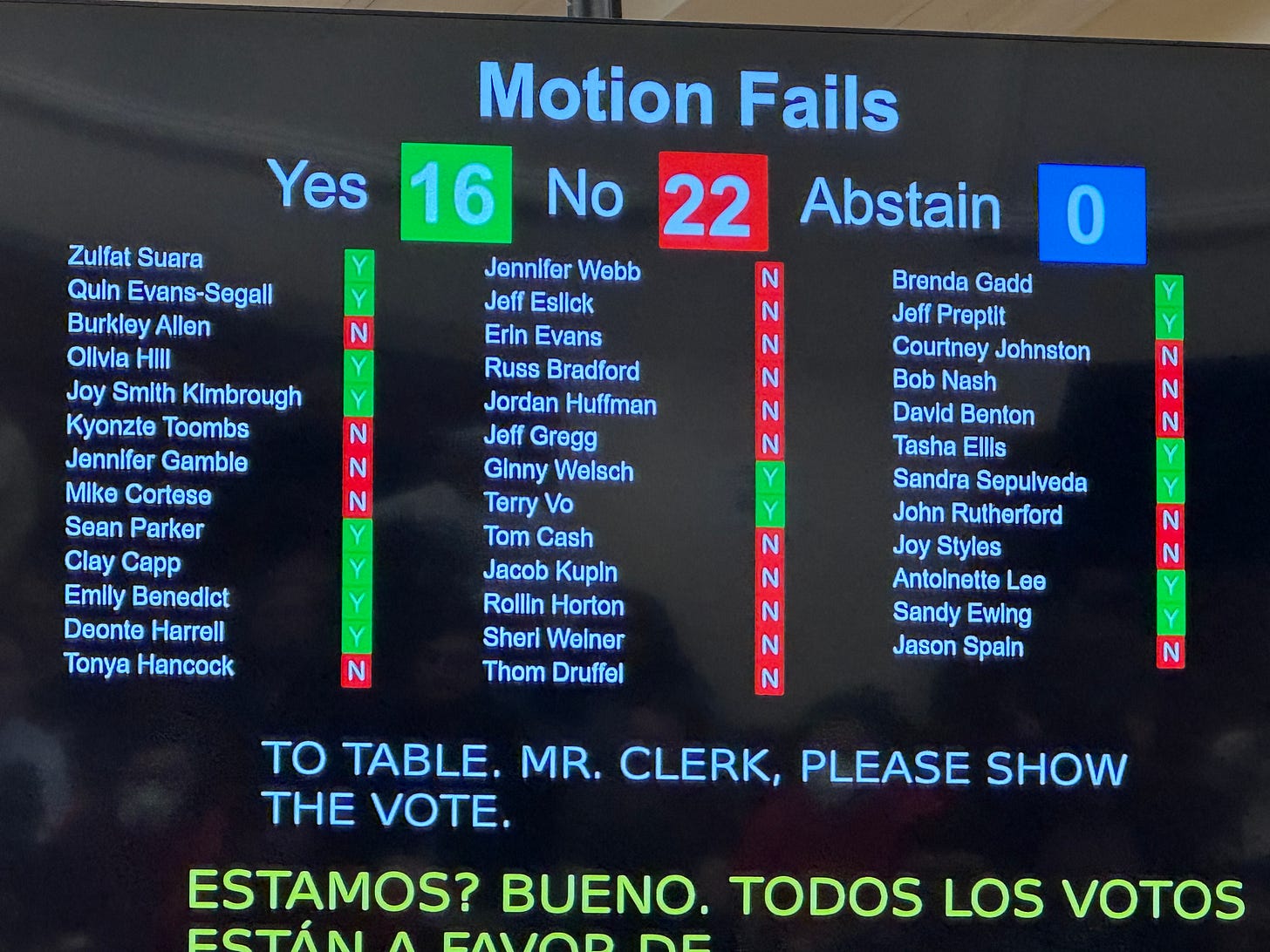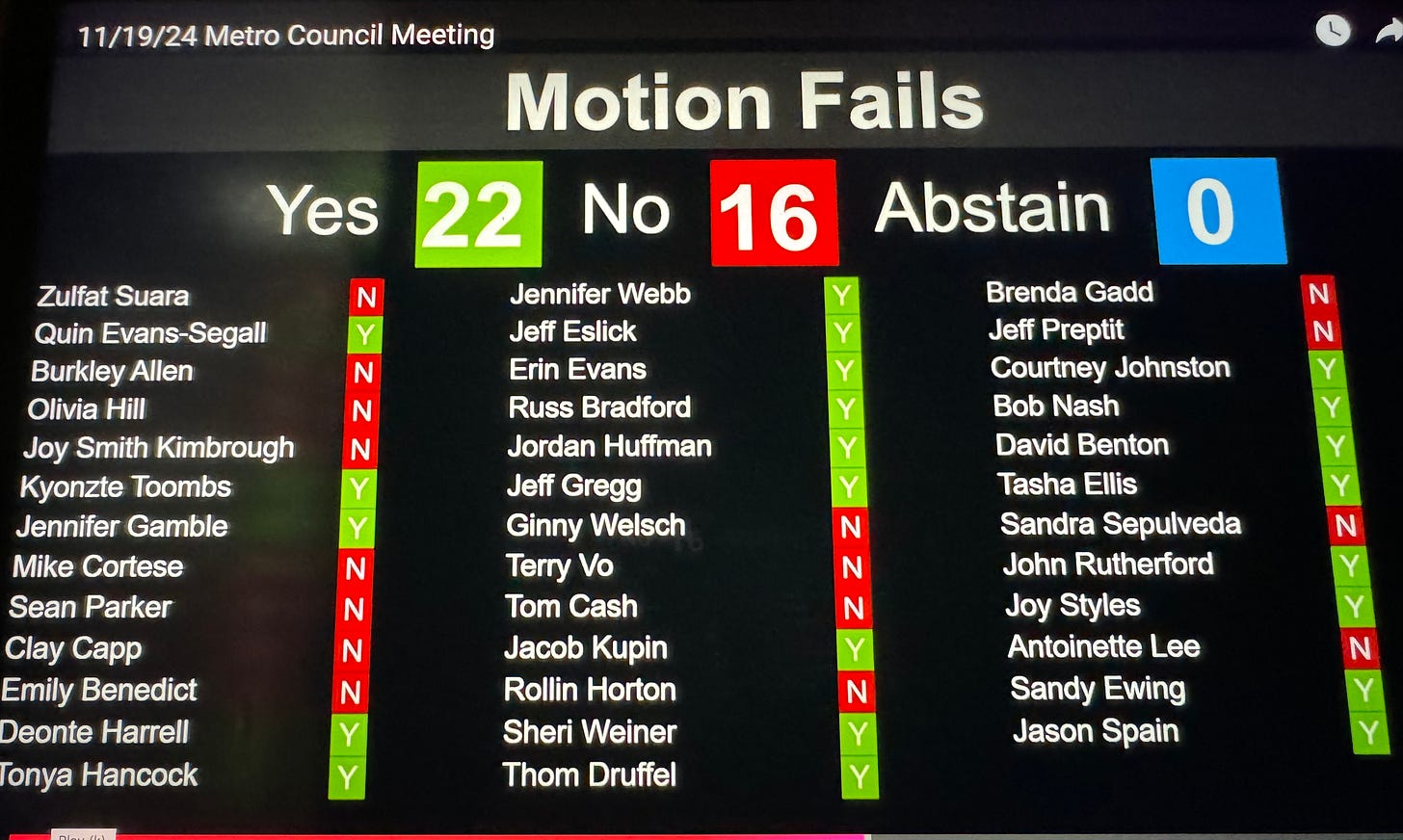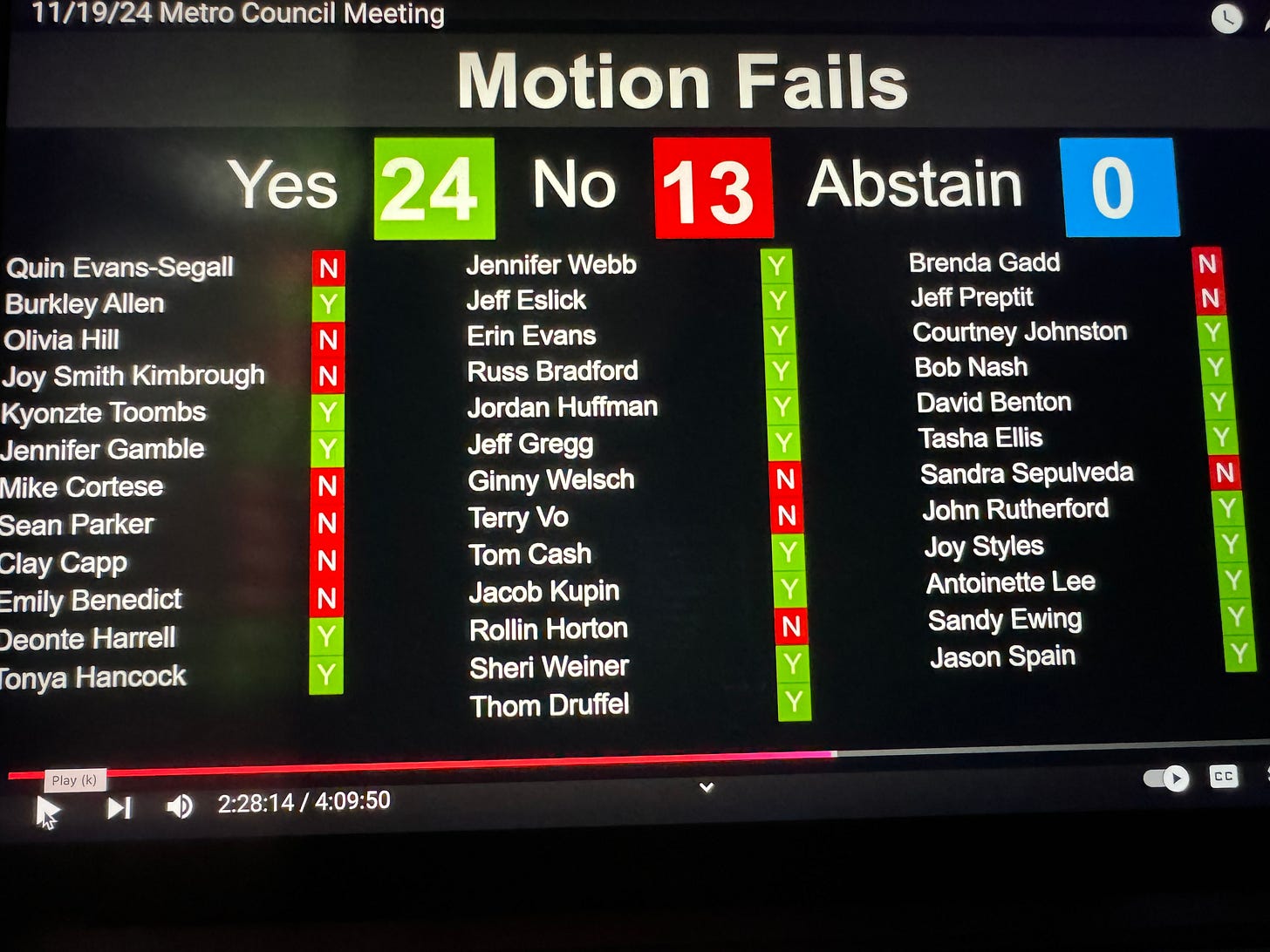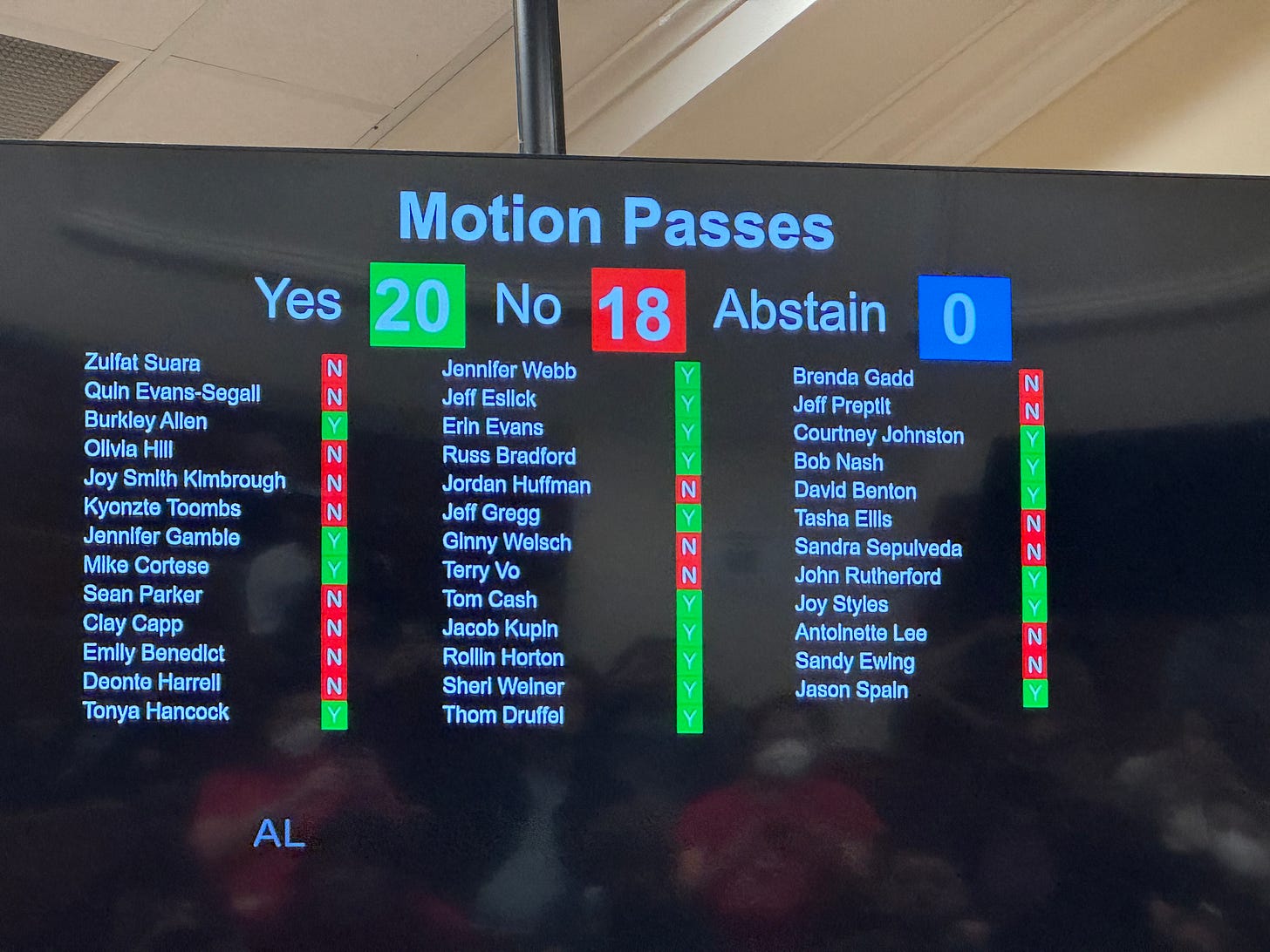Comments? Suggestions? flynnconsult@gmail.com
Friends, I’ve avoided writing this piece because I didn’t want to pile on more news- most of which is bad and ugly. I still believe it’s important to share what’s going on locally from my limited perspective. So, here goes.
It’s taken a bit to adjust to our new national reality and cogitate on how the political landscape may embolden the Tennessee Republican Supermajority. We’ve gotten an inkling from the swift action taken by Governor Lee to submit the very first bill of the upcoming Session intended to pass Vouchers- yes, same fight, new year.
Also this week, the Legislative Joint Government Operations Committee passed a scientifically unfounded bill that will go into effect on 12/26. It outlaws the distribution of “hemp products that contain more than .3% THCA when burned” although growers argued that “hemp does not cause an intoxication like marijuana.” The law will most likely put hemp farmers and those distributing CBD products out of business in Tennessee, thus more state revenue lost. News Channel 9 predicted “…in just the first half of 2024 alone” hemp production generated more than “$50 million in the state” while Democratic State Representative Gloria Johnson put the expected loss to the budget at closer to $2 million.
Can’t we just order CBD products from across state lines…at least for now?
In addition to the Good (MOU between MNPD and NCRB AND the Zero-Tolerance Sexual Assault Policy adoption-hopefully), this posting primarily focuses on two Resolutions that came before Metro Council over their past two meetings which may portent things to come in other Tennessee cities:
A Council Resolution to outsource the testing of fragile rape kits going back to 2015. (Does its passage mean no police accountability for the last 10 years when MNPD maintains it didn’t have qualified staff to manage this critical police investigative function?)
A Council Resolution to fund FUSUS, an interlocking private and public surveillance system throughout the city (FUSUS). (Did the Council vote to defer the Resolution until its December 3rd meeting because it was unwilling to face the over 40 people who testified against adoption, along with key Council members who gave bracingly emotional testimony against the installation of these cameras, while knowing any proposed Amendment would not address the very credible arguments against this big-brother technology?)
Metro Council members need to hear from you about these and other issues that will be increasingly coming before them over the next year as our most basic rights are being challenged. It’s also important to thank those Council members when they vote in alignment with your values and address your concerns.
Next Council meeting? December 3rd.
While we engage during this time of deep questioning, we remain thankful for our blessings, vigilant in our determination to protect others from harm and commit to restoring the strength we need for the important work of critical resistance ahead.
Peace, Salam, Shalom, and Ase. Michele
The Good
1.) MOU finally to be signed? It took just a bit longer than a year for the Metro Nashville Police Department (MNPD) to carry out its mandate to collaboratively craft a Memorandum of Understanding (MOU) with the Nashville Community Review Board (NCRB).
The question now is how long will it take Chief Drake to put his stamp of approval on the MOU, since he was not present during negotiations between lawyers and NCRB staff who crafted the document?
Alisha Haddock, NCRB Board Chair praised the completion of the MOU awaiting Drakes’ signature.
The MOU is critical to the NCRB’s ability to clear the backlog of citizen complaints about police misconduct, which accumulated during this delay. While the NCRB can no longer investigate complaints directly, as was possible under the original Oversight Board (due to the Legislature removing this authority), they are now charged with reviewing Department findings regarding citizen complaints about police misconduct to determine if the NCRB concurs or instead determines the need for officer and Department modifications to change behavior and increase accountability.
Two things are important to remember about this whole endeavor. First, according to the Whistleblower complaint under review since June by an outside investigator, the Tennessee Legislature was assisted by MNPD staff to craft the bill stripping the original Nashville Community Oversight Board of its investigative powers regarding complaints about police misconduct.
Having waited since June to receive the final report from the Investigator, can we expect it to be forthcoming before the end of 2024?
Second, is the sudden willingness of MNPD to complete the MOU, after dragging its feet until just recently, because the Administration is uneasy about the MOU hanging incomplete when the investigative report is released?
2.) Not an agency to just sit around waiting for another Metro agency or leader to take action, in August the NCRB published a Zero-Tolerance Sexual Misconduct Policy for MNPD. The Women’s Committee of the Council then crafted a Resolution supporting this Policy, which was passed by the full Council on 10/15. We are merely waiting for the city’s Human Resources Department to complete its review to ensure the Policy complies with civil service requirements. Hopefully, the Mayor will issue a mandate requiring MNPD to adopt the Policy.
Dare we hope that Mayor O’Connell offers a holiday gift to all the women working within Metro government by requiring the adoption of the Zero-Tolerance policy throughout every city Department in Metro?
More than good, this would be great!!
The Bad
Two Resolutions under discussion at the 11/7 Metro Council meeting, one of which was deferred to the 11/19 meeting, relate to policing practices in Nashville.
1.) Resolution RS2024-831- Nashville has a backlog of over 700 rape kits that have been languishing untested going back to 2014. Victims of rape in our city who courageously reported and underwent testing to collect these samples have been waiting for these perpetrators to be arrested and prosecuted while the greater Nashville community has remained unprotected from additional rapes by these criminals. We are now told that MNPD did not have qualified staff to carry out this critical function FOR THE PAST 10 YEARS!! The truth is that this testing was clearly not a law-enforcement priority.
Vice-Mayor Henderson read the Resolution allowing MNPD to accept a grant to outsource the testing of Nashville’s 725 rape kits to a national entity that will join the close to 100,000 untested rape kits from other communities across the US.
Many of these samples are extremely delicate and their integrity as well as their respective confidentiality needs to be diligently preserved, given the time that has elapsed.
Nashville Community Review Board (NCRB) Director Jill Fitcherd addressed several key questions about this Resolution during her public comments: 1.) How did the backlog occur? 2) What systems are in place to prevent a backlog from occurring in the future? 3.) What are the credentials of the chosen vendor, testers, and laboratory? 4.) How many cases will be transferred for testing and how long will it take for completion of the testing? 5.) What is the chain of custody process related to shipping, storage, and handling of confidential information, and notification to vendors? 6.) How will test results be interpreted, delivered, and uploaded into the FBI database?
When the Resolution was brought up for a vote, Councilperson Welsch asked for a two-meeting deferral to secure answers to Director Fitcherd’s questions.
Councilperson and Sponsor Evans then asked the Administration whether Fitcherd’s questions had been considered during the Committee meeting when the Resolution was under discussion.
Adminstrative spokesperson Rosenberg responded that while MNPD had opened the first local crime lab in the country in 2015 they had not filled the position needed to conduct rape kit examinations (for almost 10 years??!! What had they prioritized if not rape kits?) and therefore MNPD had not conducted the necessary analysis. Yet, now that there is a fully staffed forensic unit able to keep up with incoming cases, they are still unable to address (unwilling to prioritize?) the “backlog of 725 cases” needing testing. Given that the Department of Justice is offering grants to communities to test the 100,000 untested kits nationwide (yes, Nashville, sadly we are not alone in overlooking this critical aspect of police investigation), Nashville is poised to receive a grant of $243, 000 to test our 725 kits.
No one is questioning WHETHER these kits should be tested, given that women have been waiting way too long for closure. What IS fair to ask of MNPD is that they inform the community as to what safeguards will now be in place to ensure this dated evidence is very carefully managed and to answer the pertinent question as to when we can expect the results of these tests so victims will know how much longer they need to wait for justice.
Evans expressed being “on the fence” about a deferral, given Fitcherd’s questions and Rosenberg’s less-than-convincing response.
Clearly, Councilperson Huffman’s outrage, as seen in the following video, is totally misplaced. No one, especially not any woman in Nashville and certainly not the Director of the NCRB, would promote the idea that the city should wait any longer to address the backlog, as Huffman seems to be suggesting.
And Councilperson Nash was totally out of line to suggest that Fitcherd had come to the Council meeting to “throw a bomb out” rather than to raise important questions for consideration.
Thankfully, Councilperson Ellis cautioned Nash to “just be careful” about making inflammatory comments regarding testimony by a Metro employee who is offering their expertise.
Not to be deterred, Nash continued with his attack, saying the NCRB and Fitcherd “Must not have enough to do because this is not the first time at the last minute they dropped a bomb” regarding management decisions made by Chief Drake. He then asked that the vote on the Resolution not be deferred.
Councilperson Johnson added that there have been discussions over the past few months about “handling those things in a very expeditious way” and the backlog of rape kits “has been talked about for a couple of years” so these women and men should be given the closure they need.
Everyone certainly agrees with this statement- but the relevant questions not to be dismissed are: by whom, how, and within what time frame?
Evans cautioned her colleagues to be respectful in their comments when Directors from Metro Departments come to speak about concerns. They should be listened to given they are trying to help the Council reach good decisions. “They are not coming to drop a bomb on anything. They are coming through with valid concerns.”
Yet, Evans still supported moving forward with a vote on the Resolution.
Councilperson Porterfield seconded what Evans had said.
Councilperson Capp then highlighted the importance of moving swiftly to test kits because those accused of the crime of rape are also waiting “a long time to have evidence reviewed and turned over to them,” and sometimes the evidence supported an exoneration. “The backlog affects the whole functioning of the system and it is significant and important to clear it up.”
Following the debate, the Council voted to approve the Resolution.
Will the 725 victims be informed by anyone in Metro as to when they can expect the results of their rape kit to be provided to them? Wouldn’t you at last want this, given more money will be passing hands while you are left waiting?
2.) RS2024-791- MNPD Survey: During the Public Comment period at the 11/7 Metro Council meeting, Reverend Davey Tucker, Director of the Metro Human Relations Commission (MHRC), testified regarding MNPD’s plan to survey themselves to see how people feel about the Department. Tucker offered MHRC’s expertise to help MNPD carry out an unbiased study that would utilize best-practice survey tools.
During the Council discussion regarding the Resolution, Sponsor Councilperson Porterfield identified several concerns about the software in question and recommended a one-meeting deferral to allow time to consider other potential software options.
Councilperson Parker concurred with the request for a one-meeting deferral, commenting that social media interactions may not be the most informed and high-quality tool to reach a diversity of Nashvillians operating outside the social media sphere.
During the Public Comment period at the following Council meeting on 11/19, Director Tucker reported that MNPD had not followed up with him about his offer to assist them with their Survey. He asked the Council to delay their vote for one additional meeting to allow MNPD time to collaborate with MHRC regarding their expertise and guidance in carrying out the Survey.
During my Public Comment, I questioned why MNPD would not want to take Tucker up on his generous offer- unless they were merely interested in putting forward a public relations document.
During consideration of the Resolution by the Council, because Sponsor Porterfield was not present, Evans made a motion to approve the Resolution.
Huffman then spoke in favor of approving the Resolution, saying it uses a straightforward technology that has been implemented in other cities that also used social media tools to target audience participation. He further said it is important to “get better information on our constituents… police precinct by police precinct.” He agreed that MNPD could collaborate with MHRC on the survey design but this did not require a deferment on the vote.
Councilperson Suara talked about “going into hiding” after the election but then re-emerging with a stronger willingness to fight against making it easy to collect private information on people.
Councilperson Benedict moved for a one-meeting deferral to hear what MHRC would recommend as an appropriate methodology for the survey.
Nash suggested that both a police-managed survey and an MHRC-managed survey could happen simultaneously.
Johnson said this was not the point of the Resolution. Instead, all that is in question is the software being offered to MNPD to conduct the survey, so a deferral for any other reason is unnecessary and should not occur.
Parker spoke in favor of a one-meeting deferral noting there remained questions about the Survey methodology and how it would reach diverse communities, so after consultation with Council Assistant Darby, he countered that no harm would occur if the vote was deferred.
Huffman clarified that what Metro would be purchasing was the survey platform and not a stock of set questions so he didn’t see the need for a deferral.
When a voice vote was taken, the members AGREED to a one-meeting Deferral.
The Ugly
1.) FUSUS: The Nashville Community Review Board published a recent report (updated) regarding FUSUS that was shared with the Public Safety Committee members on 11/19, before the full Council meeting.
FUSUS is a law enforcement surveillance technology that is proposed to link private businesses and individual home cameras into one central police observation location. As shown in this photo, the Council Chamber was packed, mostly with the 41 folks planning to speak AGAINST the adoption of the FUSUS technology by MNPD.
Of the 3 older white people who spoke in favor of FUSUS, featured below is the one Jewish speaker. This is followed by a selection of 12 people out of the 41 individuals from very mixed racial, ethnic, age, class, and religious backgrounds who spoke against the purchase of the FUSUS surveillance technology.
Please be sure to scroll forward after these public comments so you can listen to the very moving statements offered by Councilpersons Sepulveda, Vo, Preptit, and Suara regarding the negative impact on their respective communities if the Council were to vote in favor of implementing FUSUS surveillance in our city.
Steve Hersh
Craig Bardo
Sabina Hobedine
Brosman Schmidt
Natalie Schilling
Stephen Watts
Macey Fluhearty
Constituent of 33rd District
Lydia Yousef
Nicole Williams
India Pungarcher
Judith Clerjeune
Cathy Cario
When the Council began their debate regarding the FUSUS Resolution, Evans asked for a one-meeting deferral. Sepulveda stood up immediately to propose a motion to table the deferral so that members would have to vote on FUSUS that night, in front of all the community members who had turned out to testify and watch their vote. A debate then began between Evans and Sepulveda, with Evans going first.
Sepulveda then made an impassioned plea for Council members to vote against the deferral. During her comments, Sepulveda asked Council members Vo, Preptit, Suara, and Hill to stand up because they represent specific communities most likely to be targeted by FUSUS surveillance.
However, when the vote was taken, 16 voted “Yes” (with Sepulveda) to table the deferral vote BUT 22 voted “No” (with Evans) against tabling the deferral motion.
A discussion then began regarding Evans motion for a one-meeting deferral.
Suara spoke first.
Hancock called the question, which is a motion attempting to stop all debate. This motion required 2/3’s to pass, so with a vote of 22-16 it failed and the debate continued.
Vo then spoke passionately against deferring the vote and instead wanted the Council to vote on the Resolution that night.
Johnson was the next to call for the previous question, meaning she wanted to stop the debate and move to a vote on the deferral. The motion failed again because it did not get a 2/3rds majority.
Preptit then stood to speak against the deferral motion.
Likewise, Welsch spoke against the deferral motion.
Benedict followed, joining the chorus against the deferral motion.
Suara also said there was no need for a deferral and asked that a vote be held that night on whether to fund FUSUS or not.
Horton, Weiner, and Nash spoke in favor of the one-meeting deferral and said additional safeguards could be added to address safety concerns and to make the bill better.
The vote for a one-meeting deferral won, with 20 for and 18 against, because a simple majority was all that was needed. Please note those Councilmembers who voted FOR the deferral (especially those who have held themselves out as progressives) to let them know you are not happy with their vote.
FUSUS does not stop a crime from happening. It is an investigative tool to be used by police to apprehend a perpetrator after the fact. While having surveillance cameras on public buildings and private homes linked to a central location may cut back on response time, it is a high price to pay for the loss of privacy by those who have not agreed for themselves or their visitors to be surveilled. There is also a very credible concern about the possibility of this technology being misused or used to hurt marginalized communities in Nashville, such as by ICE rounding up Hispanic and Latino individuals suspected of being in the US illegally.
After almost 3 years of protesting AGAINST the adoption of FUSUS surveillance in Nashville, the final vote for and against its adoption will take place at the December 3rd Council meeting.
A report by The Tennesseean regarding the Council vote can be found HERE along with Channel 4 coverage following the Council meeting HERE.





